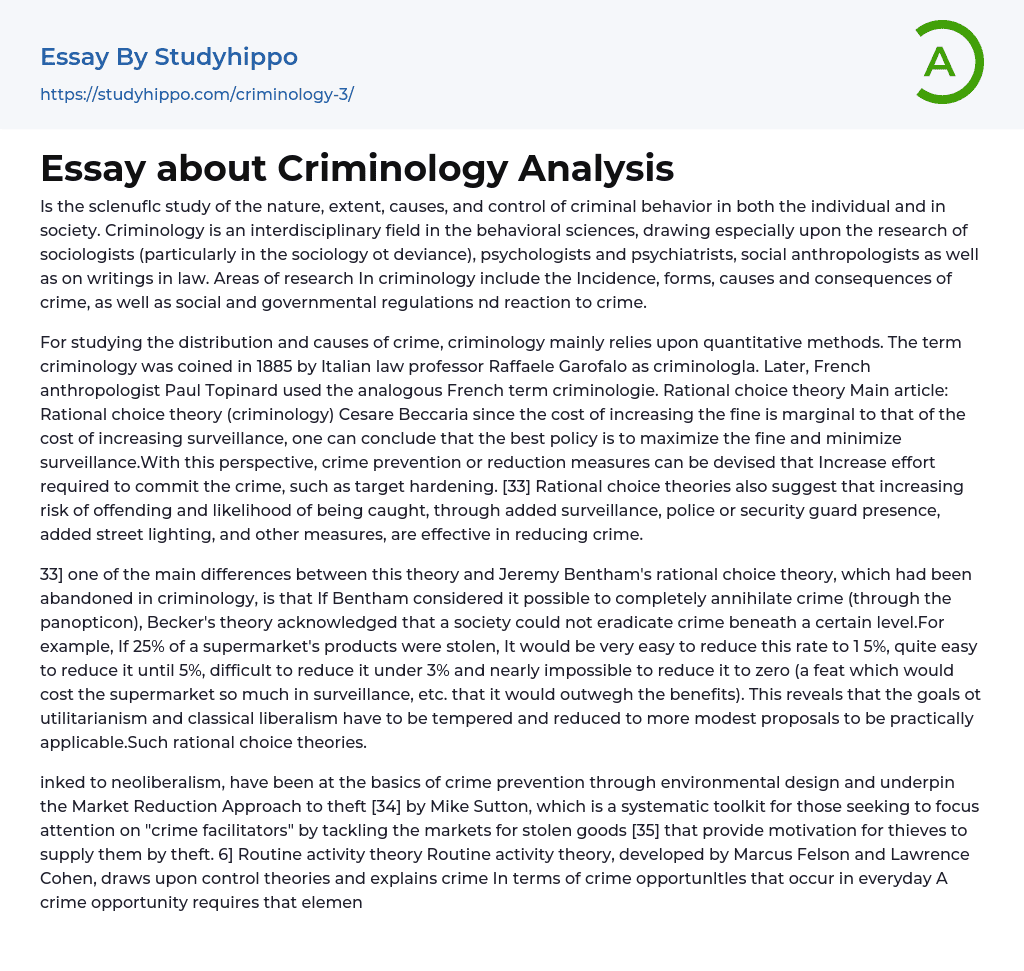Criminology is a scientific inquiry into criminal behavior in both individual and societal contexts. This interdisciplinary field incorporates research from experts in sociological studies of deviance, psychology, psychiatry, social anthropology, and law to examine different forms of crime occurrence, its causes and effects, as well as governmental and social responses to crime.
The study of crime distribution and causes in criminology relies mainly on quantitative methods. The term "criminology" was first introduced by Raffaele Garofalo, an Italian law professor, in 1885 as "criminologla." Later, French anthropologist Paul Topinard used the similar term "criminologie." Rational choice theory (criminology) concentrates on maximizing fines while minimizing surveillance. According to cost analysis, increasing fines is more efficient than boosting surveillance. This perspective influences efforts to prevent and decrease crime by making it harder to commit crimes throu
...gh target hardening and reducing the probability of being caught via measures like increased surveillance, police or security guard presence, and improved street lighting.
One key distinction between Jeremy Bentham's rational choice theory (which was abandoned in criminology) and this theory is that while Bentham believed in the possibility of eliminating crime completely through the use of the panopticon, Becker's theory acknowledges that society cannot completely eradicate crime beyond a certain threshold. For instance, if a supermarket experiences a 25% theft rate, it is straightforward to lower it to 15%, simple to decrease it further to 5%, challenging to reduce it below 3%, and almost impossible to bring it down to zero (as the costs of surveillance would outweigh the benefits). This demonstrates that the objectives of classical liberalism and utilitarianism must be modified into more feasible proposals for practical application in rational choice theories.
Th
foundation of crime prevention through environmental design and the Market Reduction Approach to theft by Mike Sutton are linked to neoliberalism. The latter provides a toolkit for focusing on "crime facilitators" and tackling the markets for stolen goods that motivate thieves to steal. Routine activity theory, developed by Felson and Cohen, explains crime opportunities in terms of converging elements of a motivated offender, suitable target or victim, and lack of a capable guardian. A place manager, such as rental property managers who can take nuisance abatement measures, was added by John Eck as a fourth element. Biosocial criminology aims to explain crime and antisocial behavior by exploring both biological and environmental factors, recognizing the potential contributions of genetics, neuropsychology, and evolutionary psychology alongside sociological theories in contemporary criminology.
The National Deviance Conference (NDC) group was formed in 1968 by young British sociologists. The group, which was restricted to academics and had 300 members, included Ian Taylor, Paul Walton, and Jock Young. These members rejected previous explanations of crime and deviance, leading them to pursue a new Marxist criminological approach. In their work titled The New Criminology, they disputed the biological "positivism" perspective put forth by Lombroso, Hans Eysenck, and Gordon Trasler. Additionally, the Marxist perspective on crime suggests that "defiance is normal" and that men are now consciously involved.
Marxist criminologists advocated for a society that does not criminalize human diversity, whether in terms of social or personal factors. They contended that crime is not caused by genetic or psychological factors, but rather by the material conditions of a particular society. This was their way of ensuring the preservation of human diversity. [43]
- Animals essays
- Charles Darwin essays
- Agriculture essays
- Archaeology essays
- Moon essays
- Space Exploration essays
- Sun essays
- Universe essays
- Birds essays
- Horse essays
- Bear essays
- Butterfly essays
- Cat essays
- Dolphin essays
- Monkey essays
- Tiger essays
- Whale essays
- Lion essays
- Elephant essays
- Mythology essays
- Time Travel essays
- Discovery essays
- Thomas Edison essays
- Linguistics essays
- Journal essays
- Chemistry essays
- Biology essays
- Physics essays
- Seismology essays
- Reaction Rate essays
- Roman Numerals essays
- Scientific Method essays
- Mineralogy essays
- Plate Tectonics essays
- Logic essays
- Genetics essays
- Albert einstein essays
- Stars essays
- Venus essays
- Mars essays
- Evolution essays
- Human Evolution essays
- Noam Chomsky essays
- Methodology essays
- Eli Whitney essays
- Fish essays
- Dinosaur essays
- Isaac Newton essays
- Progress essays
- Scientist essays




